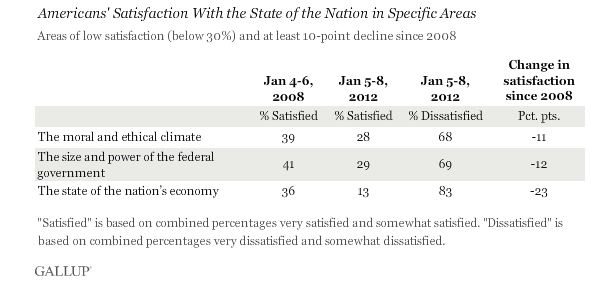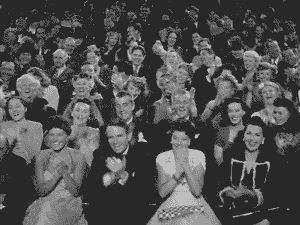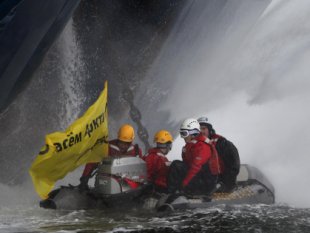Election Diary, Venezuela
The Ballot and the Bullet
by GEORGE CICCARIELLO-MAHER
Caracas.
The Discreet Charm of the Bourgeoisie
We made the mistake of flying into Caracas as Chávez was closing his campaign in the capital, up to 3 million of his red-shirted supporters clogging seven large city streets (the opposition had crowed proudly about having merely filled the Avenida Bolivar the previous week). As we sat in traffic, the minutes stretching into hours, our taxista comrade’s triumphalism took the form of sarcasm: “You see all this traffic,” she insisted, pointing at the hundreds of buses and cars full of Chávez supporters hanging out windows, honking horns, and waving flags, “this is the proof that the Presidente will be defeated.”
On the other side of this powerfully segregated metropolis, the tension was palpable but its source unclear. Upscale supermarkets were as clogged as the streets of the city center, but instead of the poor headed home after a triumphant march that for many sealed victory, now it was the well-heeled middle and upper classes stockpiling margarine, harina Pan for making arepas, and kilos of sugar. Many, their shopping complete, threw a few extra bolos at a worker to push their shopping carts up the uneven sidewalks: such is their undeniable charm.
This hysteria echoes and is stoked by the opposition press domestically and internationally, and some of the fears are comical at best, as with the self-styled exile who had a hard time finding a phone card in Caracas’ wealthiest neighborhood: surely the world must be rapidly approaching its end. While we expect such things from what is often dismissed as remnants of the “rancid oligarchy,” arguably more surprising was the coverage in the run-up to the election provided by The Guardian‘s Rory Carroll, who piled unsubstantiated claims upon nonsense to create a sense that the Chávez campaign was stumbling amid its patent inability to govern the country.
What are they afraid of, these domestic and foreign sowers of worry and discord? A combination of an irrational, racist, and classist fear of the Chavista other, and a deeper fear of themselves: the knowledge that if anything happens after the election, it will almost certainly be their doing. For Chavistas, awareness of the possibility of an opposition “Plan B” is the only damper on their expectations of victory.
Preparing for a Plan B
The night before the elections, I attend a clandestine security meeting in a barrio of southwestern Caracas, no doubt one of many such spontaneous gatherings of revolutionaries to discuss the possible security scenarios the election might bring. The participants discuss a plan for anonymously escaping from the neighborhood in the event of a coup or local clashes, but simmering under the surface is the question of what to do if Chávez loses, knowing full well that many of the most militant collectives which dot the Venezuelan political landscape have no intention of accepting defeat. “The Tupamaros aren’t going to sit around with their arms crossed,” one suggests.
This question of whether or not to recognize an opposition victory at the polls is hopelessly entangled with the certainty that no such victory is possible: as former vice president and current mayor of western Caracas put it at a press conference, Chávez will lose cuando las ranas echan pelos, when frogs grow hair. But there is also the very real and open question of whether such a massive step backward could be justified to conform to the formalities of a representative democracy that has always been viewed with suspicion by grassroots revolutionaries seeking to build a more participatory and direct form of democracy.
Another rejects the mere suggesting of leaving the barrio: “We can’t be cannon fodder, but why would we flee?” The specter of Chile and Pinochet’s coup hangs heavy, a constant reference point for hopes crushed and mistakes made, and the majority of revolutionary collectives seem to have learned the fundamental lesson of the Chilean tragedy. As one puts it, “I never have confidence in the police, in the military,” and the only trustworthy bulwark against the forces of reaction is popular self-defense
“Va a haber un peo”
At 3:15 in the morning, the trumpet calls of the toque de Diana shook the city from its tense half-slumber. Here the imperative to vote early is taken with the utmost seriousness, and before 4am many in Chávez strongholds had already taken their places outside their polling stations.
First thing in the morning, I head to the historically combative neighborhood of 23 de Enero with some comrades to take the pulse of the most extreme fringe of the Chavista movement, those armed revolutionary collectives and popular militias whose very existence is an open affront to the state’s monopoly of force. When we approach the headquarters of Radio 23 Combativa y Libertaria, lookouts spot us and a motorcycle trails slowly behind to make sure we’re not up to no good. Glen, a local revolutionary leader whose failing sight does little to dampen his revolutionary extremism, speaks to us frankly about how he sees the scenario: “creemos que va a haber un peo,” the opposition is likely to cause some sort of disturbance and refuse to accept the results of the election.
The often tense relations between the dozens of armed collectives operating in el 23 have been put aside to make military and political preparations for such an eventuality: “candela que se prenda, candela que apagamos, whatever fires they light, we will put out” (here not speaking entirely metaphorically). The opposition has used their wealth to accumulate weaponry, he tells me, but this doesn’t worry them too much, since guns come with balas not bolas, they come with bullets but not the prerequisite “balls” to pull the trigger.
Glen is more unambiguously Chavista than when I spoke with him four years ago amid heightened tension between the collectives and the police. No amount of intermittent tension with the government could justify a return to the past: “before we were persecuted, we were imprisoned, we were murdered… We are no longer clandestine thanks to Chávez.” It is precisely those who have felt the hot lead of governments past who are least likely to accept any step backward, and Glen is no exception: they do not believe that there is any chance that Chávez will lose the election, but if this were to happen they have absolutely no intention of accepting the result, despite the fact that they believe that Chávez himself would.
But he also sees this election as Chávez’s “last chance”: the popular masses support Chávez, but have a “contained rage” toward the abuses perpetrated by those who often wear the red shirts of Chavismo. The forces of the revolution will only be undermined if corrupt or out-of-touch candidates are imposed from above in the upcoming regional elections. “Every day the war, the combat intensifies, and the right, the majunches no dan tregua, they don’t rest in their effort to retake spaces of power” once controlled by revolutionaries.
The day that this Revolution becomes reformist, all will be lost: “Chávez is our spokesperson. It’s not that he’s indispensable, but he’s indispensable at this moment.” Despite his open and unmitigated support for this leader without whom a civil war would be almost inevitable, Glen nevertheless does not mince words: “either Chávez assumes the task [of deepening the process] or he can fuck off.”
Between Constituent and Constituted
In a powerful instantiation of the peculiarities of revolutionary Venezuela, where we speak to Glen is but a few minutes walk and a rickety barrio stairway away from where Chávez himself is preparing to vote. The press and supporters gather in the hot sun and wait more than two hours for the Comandante to show his face, with cheers erupting for every minister and local political leader who arrives on the scene. When Chávez himself arrives, the roar is deafening:
Uh, Ah, Chávez no se va
Chávez isn’t going anywhere
Pa’lante, Pa’lante, Pa’lante Comandante
onward, onward, onward Comandante
None of this is surprising, but less noticed is the fact that these elected officials, these representatives of the people who occupy positions in the structures of constituted power, are waving to the adoring crowds from beneath murals and banners of yet another revolutionary collective, Alexis Vive, which while supporting the government similarly maintains a fierce constituent independence from the centralized power of the state.
This peculiar interweaving of constituent power and constituted state authority which characterizes our itinerary throughout the day, is a profound and frequently misunderstood element of the political process underway in Venezuela. Much of this misunderstanding, moreover, comes from the fact that constituted power is often hesitant to publicly embrace its own revolutionary constituents. Chávez frequently condemns as “ultra-leftist” the provocative actions of the collectives, and most centrally La Piedrita, led by Valentín Santana, who on paper at least is being sought by the police and is subject to arrest. But as one militant tells me, it was at the behest of the Chávez government itself that Santana was laying low in the run-up to the election, since such provocations could only harm the president’s re-election effort. Such discomfort at the closeness of the movements is understandable for those tasked with governing, but it is also the most powerful motor that this revolutionary process has.
In the afternoon, belly full of the sort of hearty sancocho stew that isn’t to be found in wealthy parts of the city, I head to the southern barrio of El Valle, where the revolutionary organization Bravo Sur has established a sala situacional. These salas are, like the security meeting of the previous night, makeshift headquarters established to keep track of current developments and to make the decisions necessary for any eventuality. A ten-year-old stands up, displaying his right pinky finger, painted to look as though he, too, had voted, giving an improvised speech on his expectation that Chávez will win, and that if he doesn’t, estamos perdidos todos, we are all lost.
As afternoon becomes evening, however, optimism in the room gives way to clear worry, stoked by text messages flowing in from across the country, and rumors that Chávez has lost his home state of Barinas due to the mismanagement of his family (this proved untrue), that his lead has dwindled in early reporting to a mere 7 percent, and that some armed provocations from the opposition were already appearing in Petare, the largest and most dangerous of Caracas’ barrios. By 6:45 texts from Miraflores Palace speak of a 12 percent margin, others of 15 percent, but as the polls close, no one is resting comfortably.
Soldiers and Revolutionaries
It’s time to zip across the city once again, back toward the capital, this time perched precariously on the back of a motorcycle. A comrade asks me, “do you want to go safe or fast?” “Both” doesn’t seem to be an available option and so I settle for the latter. As we tear across the city, slowing only slightly for red lights, strangers shout “Ganó!” from street corners: “He won!” Back in the heart of the revolution, 23 de Enero, the celebration has begun. Despite the ley seca, or dry law, rum and beer is flowing freely and many haven’t slept for 36 hours already. Amid the pounding reggaeton and the din of motorcycle engines, a red-clad woman eulogizes her “beautiful president, who has always had his feet in the dirt like us.”
As I stand speaking with her in the recently renovated Che Guevara Plaza overlooking the Coordinadora Simón Bolívar, the National Electoral Council announces that Chávez has been re-elected by a margin of 10 percentage points. The barrio explodes, and massive fireworks appear in the sky over 23 de Enero. While 10 percent would constitute a landslide anywhere else, the celebration is as much about relief as anything else: for a candidate that won by more than 20 percent in 2006, this race was too close for comfort.
At the Coordinadora, the particularities of this unprecedented revolution are on full display. Two paratroopers roll up on a motorcycle with AK-47s, dismount, and to the joy of the crowd shout “Viva Chávez!” They have clearly been here before, and stride confidently into the Coordinadora, which is housed in a former police outpost and torture station. In a powerful and touching expression of the unprecedented fusion of revolutionaries and soldiers that has emerged in recent years, one warmly embraces Juan Contreras, a longtime militant and founder of the Coordinadora who for many years was the emblem of struggles against the existing order. Watching this uniformed and armed soldier hug someone who was considered a terrorist for most of his life, I realize just how far we are from the Chilean example.
By now, hundreds of bullets from handguns and automatic rifles fly from every rooftop, and even these paratroopers cringe as a batch of fireworks misfire only 20 feet away. Someone notices that the opposition candidate Henrique Capriles Radonski is preparing to speak, and we pile into the front room of the Coordinadora, ragtag revolutionaries, foreign sympathizers and collaborators, and soldiers with automatic weapons hanging from their shoulders, to listen with a surprising level of respect as Capriles accepts defeat.
To paraphrase the great revolutionary thinker C.L.R. James, we could say that revolutions do not occur at the ballot-box, they are merely registered there, and while the dialectic is in practice more complex, there is a fundamental truth to this statement. This election, like Chávez himself, is the result of something far more profound that has been developing for decades, and which has accelerated considerably in recent years. It is only by grasping this fundamental truth that we can hope to contribute to the further deepening of the Bolivarian Revolution over the next six years.
George Ciccariello-Maher teaches political theory from below at Drexel University in Philadelphia, and is the author of We Created Chávez: A People’s History of the Venezuelan Revolution, forthcoming from Duke University Press. He can be reached at gjcm(at)drexel.edu.
Let’s keep this award-winning site going!
| Yes, audiences applaud us. But do you?If yes, then buy us a beer. The wingnuts are falling over each other to make donations…to their causes. We, on the other hand, take our left media—the only media that speak for us— for granted. Don’t join that parade, and give today. Every dollar counts. |
|---|
| Use the DONATE button below or on the sidebar. And do the right thing. Even once a year. |
Use PayPal via the button below.
THANK YOU.
//











